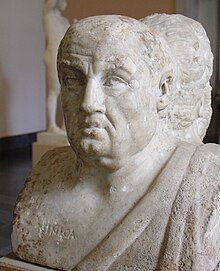Seneca the Younger
Lucius Annaeus Seneca was a Roman philosopher, poet and politician. He was born about 4 BC in Córdoba in Hispania (which is now in Spain). Seneca's father was a writer known as Seneca the Elder. Seneca's mother was called Helvia. Seneca often lived in the city of Rome. He died by suicide in year 65.

During the reign of Roman emperor Claudius, Seneca was sent in exile to the island of Corsica for nine years. This act was caused by Messalina who was the wife of Claudius. In 49 AD Claudius married his own niece Agrippina, and she called Seneca back to Rome to be a tutor for her son Nero. Nero became emperor in 54 AD, and Seneca helped him to rule the Roman Empire for the next five years. After 59 AD, Nero became like a tyrant, and Seneca lost control over him. In 65 AD Nero accused Seneca of helping the people in the Pisonian conspiracy who wanted to kill Nero. Seneca was probably innocent, but Nero forced Seneca to kill himself.
Writings change
Seneca was a very famous writer. He wrote books on philosophy, and he also wrote plays. Most of his books still exist.
His philosophy books were about Stoicism. These books include his Letters to Lucilius and his Essays (or "Dialogues"). Seneca wanted to find the right way for people to be happy, so he wrote about ethics. He believed that some emotions, including anger and grief, are bad and should be avoided. He wrote about the shortness of life, and he wrote about favours, mercy, friendship, and the need to help other people.
His plays are tragedies. They are based on Greek mythology, and have titles such as: Hercules, Trojan Women, Phoenician Women, Phaedra, and Oedipus.